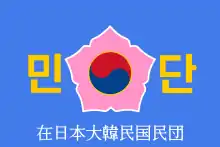Mindan
Mindan (Korean: 민단), or the Republic of Korean Residents Union in Japan (Korean: 재일본대한민국민단), is one of two main organizations for Koreans living in Japan, the other being Chongryon. Mindan has ties to South Korea and was established in 1946 in Tokyo, Japan.[1] Currently, among 610,000 Korean residents in Japan who have not become naturalized Japanese citizens, 65% are members of Mindan, and another 25% are members of Chongryon.
 Flag of Mindan | |
| Abbreviation | Mindan |
|---|---|
| Formation | October 3, 1946 |
| Type | NGO |
Official language | Korean, Japanese |
| Website | http://www.mindan.org/ |
| Republic of Korean Residents Union in Japan | |||||||
 | |||||||
| Japanese name | |||||||
|---|---|---|---|---|---|---|---|
| Kanji | 在日本大韓民国民団 | ||||||
| |||||||
| Korean name | |||||||
| Hangul | 재일본대한민국민단 | ||||||
| Hanja | |||||||
| |||||||
Mindan members prefer the modern South Korean term Kankoku (韓国) to be used when discussing Korea. Chongryon members, some of whom are North Korean fellow travellers, prefer the older term Chōsen (朝鮮). Because Chōsen was the term used during the Japanese rule of Korea and North Korea does not recognize Kankoku, this causes enmity between the groups.[2]
History
Mindan was established in 1946 as the Zai-Nihon Chōsen Kyoryū Mindan (在日本朝鮮居留民団). With the founding of South Korea in 1948 the name Chōsen was dropped, and the organization was reincorporated as Zai-Nihon Daikanminkoku Kyoryū Mindan (在日本大韓民国居留民団).[1] The Korean War (1950–1953) brought about a sharp division between members of Chongryon and Mindan, with each organization strongly supporting the North or South respectively. Mindan members went to Korea as volunteer soldiers in the conflict.[2]
As the term kyoryū, meaning "resident", became a politically sensitive term, the organization adopted its present name in 1994 by simply dropping the term kyoryū. Despite the formal renaming of the organization, it has been consistently known as Kankoku Mindan or simply Mindan in Japan.[3]
Activities
Main activities include campaigning for ahead of foreign investment regime in Japan, supporting newcomer Koreans to obtain special permanent resident, campaigning against the foreign registration order/law, campaigning for the elimination of legal and economic disparity with Japanese, Japan-Korea historical and cultural exchange based on the Korean perception of history, and publicity and propaganda against Japan and the outside world.
Mindan provided food supplies for the victims of the 2011 Tōhoku earthquake and tsunami.[4]
See also
- Japan-Korea relations
- Ethnic issues in Japan
- Koreatowns in Japan
- Korean diaspora (a.k.a. 'Dongpo' or 'Gyopo')
- Chongryon, similar organization with close ties to North Korea
- Embassy of South Korea, Tokyo
References
- 在日本大韓民国民団 [Mindan]. Nihon Kokugo Daijiten (in Japanese). Tokyo: Shogakukan. 2012. OCLC 56431036. Archived from the original on 2007-08-25. Retrieved 2012-08-05.
- 在日朝鮮人問題 [Issues of Zainichi Koreans]. Nihon Daihyakka Zensho (Nipponika) (in Japanese). Tokyo: Shogakukan. 2012. OCLC 153301537. Archived from the original on 2007-08-25. Retrieved 2012-08-05.
- 在日本大韓民国民団 [Mindan]. Dijitaru Daijisen (in Japanese). Tokyo: Shogakukan. 2012. OCLC 56431036. Archived from the original on 2007-08-25. Retrieved 2012-08-05.
- <日대지진> 피난민 "한국 곰탕.김치로 마음달래요" (in Korean). Yonhap News. 2011-04-07.
External links
- MINDAN official website (Korean, Japanese)
- History of Mindan (English)
- Online Newspaper (Japanese)
- Republic of Korea (ROK) Embassy in Japan (Korean / Japanese)